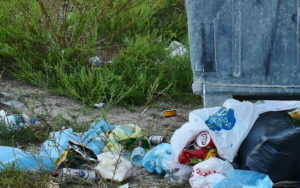
By Lindsay Street, Statehouse correspondent | Swelling bipartisan support for environmental issues made the so-called “Year of Education” look more like “Year of the Environment.”
The final-day passage of a keystone solar bill and a growing resistance to offshore drilling are being touted among the victories by conservation advocates. Thursday marked the last official day of the first year of the 2019-2020 session.

“This has been by far the best year for environmental issues, really raising awareness to issues we face in our state,” said Charleston Republican Rep. Peter McCoy, who led the charge on solar and other environmental issues.
Conservation groups have called the session a “huge victory.”
“Republicans and Democrats (fought) tooth and nail for the same legislation to protect South Carolina’s natural resources,” Coastal Conservation League Communications Director Caitie Forde-Smith said. “It’s an overall theme of progress.”
Lawmakers and environmental advocates credited voters’ shift in priorities toward environmental issues for the good year.
“The fact that those were so universally supported is a testament to how popular these ideas are among South Carolina voters,” Conservation Voters of South Carolina Executive Director John Tynan said. “We’re entering a time when support for clean energy and opposition to offshore drilling are political necessities.”
The Democratic minority leaders, Sen. Nikki Setzler of Lexington and Rep. Todd Rutherford of Richland, as well as Gov. Henry McMaster and the Republican majority leaders, Sen. Shane Massey of Edgefield and Rep. Gary Simrill of York, did not return requests to comment for this story.
Solar’s late session victory
On the last legislative day of the year, House lawmakers concurred with senators on the S.C. Energy Freedom Act, H. 3659. It now heads to McMaster’s desk for his signature.
The bill removes the cap on mandated reimbursement on residential solar and requires the adoption of new provisions governing the way in which electrical utilities purchase power generated by renewable energy facilities.
Passage of the bill signals a big political shift. In the 2018 session, the bill — originally separated into three separate bills — didn’t make a floor vote in either body.

This year’s bill sponsors, McCoy in the House and fellow Republican Tom Davis of Beaufort in the Senate, touted it as a step toward reforming the energy markets in the state.
“We had to do something fundamentally different,” Davis said of the bill in the wake of the shuttered nuclear project in Fairfield County and the promise of new energy production methods. “We really did that with this Energy Freedom Act.”
Davis said the bill moved toward deregulation of the state’s energy market and creating more competition. Environmental advocates agree.
“This is a uniquely South Carolina approach that is rooted in allowing competition,” Tynan said. “It moves us toward a market-driven energy sector that has broken the utility monopoly hold that allows clean energy to thrive and actually compete.”
McCoy said the legislation was possible because big energy providers in the state “lost footing” politically, and voters wanted more clean energy.
Two other environmental items that received the blessing of the General Assembly include:
- Water resource statewide plan ( 4011): The bill adds a “State Water Plan” as an example of a comprehensive water resource policy in which a state agency provides assistance to the governor and General Assembly in formulating; and,
- Confirmation of Lord Berkeley Land Trust head Raleigh West as director of S.C. Conservation Bank.
Local plastics bans left alone, for now
 While the solar bill did something proactive, the fact that the General Assembly didn’t ban plastic bag bans for now also is counted as a win for environmentalists and local governments. Currently, there are 17 single-use plastic bans in communities across the state, most of them near the coast, according to Forde-Smith. And there are more under consideration.
While the solar bill did something proactive, the fact that the General Assembly didn’t ban plastic bag bans for now also is counted as a win for environmentalists and local governments. Currently, there are 17 single-use plastic bans in communities across the state, most of them near the coast, according to Forde-Smith. And there are more under consideration.
Every year lawmakers mull disallowing local governments from passing such bans. Senate Bill 394 received a favorable report from committee, but environmental advocates are still pleased that it didn’t make a floor vote yet.
“Senators respect and recognize that home-rule is an important thing in South Carolina” Forde-Smith said. She called the bill not making a Senate floor vote “one of our proudest efforts.”
Davis said an effective defense helped to stall the bill.
But Forde-Smith acknowledged, “We know it’s going to be one of the first things senators take up in 2020.”
Still pending: Action on offshore drilling

The General Assembly still hasn’t officially prevented offshore drilling from taking place off the coast, but some resolutions and a budget proviso are pending. In a special session beginning May 20, lawmakers will decide whether to concur with the Senate’s budget proviso that would bar the state from allowing any infrastructure to support the industry for at least one year.
The proviso by Sen. Chip Campsen, R-Charleston, received unanimous support in the Senate, and the House has signaled strong support of offshore drilling opposition, Tynan said.
- The Trump administration has paused reopening the Atlantic to seismic testing. Read more.
“The resounding opposition to offshore drilling with the South Carolina Senate vote was a strong message that we do not want drilling off our shores,” Tynan said.
McCoy said other pieces of legislation are “all primed up and ready for us on the House floor.” McCoy and others said that while the South Carolina coast is currently not facing drilling, the legislature needs to act in 2020.
“I want to make sure South Carolina sends a strong message that we cannot and will not allow drilling off the coast,” he said.
Other fights looming in 2020
Many of the fights looming in 2020 deal with an overarching theme of dealing with climate change.
“Acting on climate impacts will only grow more urgent,” Forde-Smith said.
- This week, the United Nations released a report that says human activity is threatening millions of species of animals, including homo sapiens. Read the report.
Here are two environmentally-focused bills in committee that could be taken up early in 2020:
- Flooding. Allowance for local taxes to be used for flooding mitigation (S. 217): This bill revises provisions relating to the expenditure of the state accommodations tax, local hospitality tax and local accommodations tax. It also would allow the revenue to be expended for the control and repair of flooding and drainage at tourism-related lands or areas and for site preparation, including demolition, repair, or construction. The Senate passed the bill Jan. 23. It is now in the House Ways and Means Committee.
- More flooding. South Carolina Resilience Revolving Fund ( 259): The proposed legislation would create a fund to provide low interest loans to perform flooded-home buyouts and floodplain restoration. The Senate passed it March 20. It is now in the House Ways and Means Committee.
“We believe the House will take (the revolving fund) up quickly in 2020 and we will be there to support it,” Forde-Smith said.
The Coastal Conservation League also will push for more beach management oversight in the state to help “protect our beaches in the face of sea level rise,” she added.
Tynan said his group is poised to have more conversation as voters push for more clean energy and land protections.
McCoy said lawmakers can no longer ignore the realities of climate change in their districts, and more legislation will come in 2020 on the back of more discussions on the topic.
“You start by raising awareness to the issue. That’s how solar got started. That’s how anti-drill got started,” McCoy said. “That’s where ideas come together and where ideas coalesce.”
- Have a comment? Send to: feedback@statehousereport.com















 We Can Do Better, South Carolina!
We Can Do Better, South Carolina!
Pingback: BIG STORY: Surprising “year of the environment” ends in Columbia – Statehouse Report
Pingback: The Agenda: Nancy Mace targeted by anti-abortion rep over exceptions; Marriott adding short-term rentals | City of Charleston